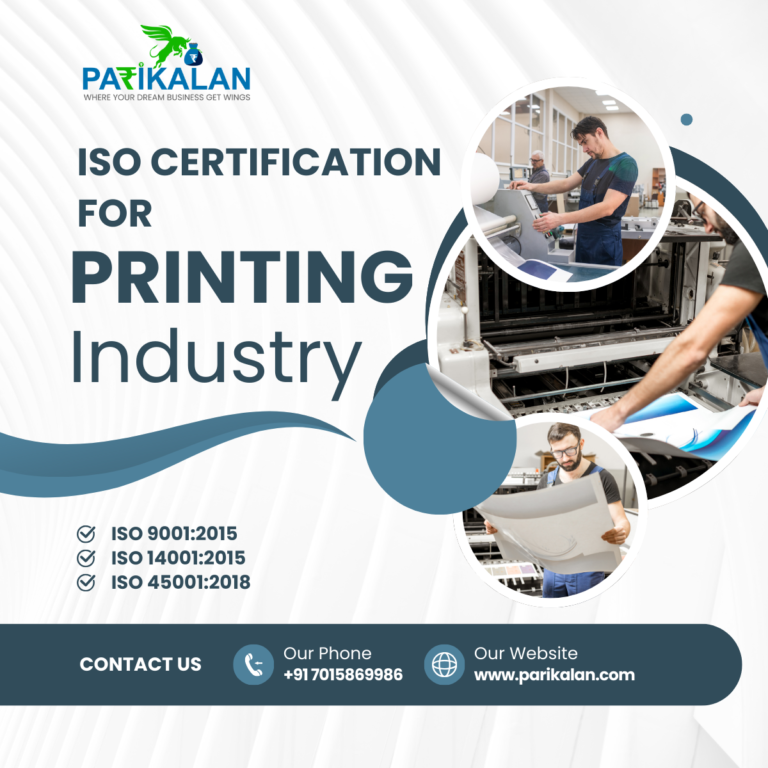Why ISO Certification is Essential for the Modern Printing Industry
The printing industry plays a vital role in producing a wide range of materials, from books and packaging to promotional products and labels. With advancements in digital printing, it has adapted to meet the growing demand for customized and high-quality print solutions. Key sectors like advertising, publishing, and packaging heavily rely on the industry. Despite facing competition from digital media, printing remains essential for marketing, branding, and product labelling. Sustainability is becoming increasingly important, prompting the industry to adopt eco-friendly practices, such as reducing waste and using recycled materials, while maintaining quality and operational efficiency.
Get Business Development Kit
Understanding the Printing Process
The printing process involves transferring ink onto paper or other substrates to create text and images. It begins with prepress, where designs are prepared for printing using software to ensure colour accuracy, layout, and quality. Offset printing, one of the most common methods, uses plates and ink rollers to transfer the image onto the paper. Digital printing is another modern method, ideal for short runs, where images are directly printed from digital files without the need for plates. Screen printing is often used for textiles and promotional materials. The process also includes post-press activities like binding, trimming, and finishing, where the final product is completed. Each method is chosen based on the print job’s scale, quality, and material requirement


Why ISO Certification is Essential for the Printing Industry
ISO certification is crucial for the printing industry as it ensures consistent quality, operational efficiency, and environmental responsibility. ISO 9001 helps printing companies implement quality management systems, ensuring reliable and high-standard production processes, which enhances customer satisfaction and reduces errors. ISO 12647, specific to colour management, guarantees uniform colour reproduction across print batches, which is vital for brand consistency. ISO 14001 focuses on environmental management, helping printing businesses minimize waste, manage resources efficiently, and comply with environmental regulations. By obtaining ISO certification, printing companies improve competitiveness, meet global standards, and attract eco-conscious clients, providing a significant edge in the marketplace .
Are You Looking To Enhance Your Business Credibility And Quality Standards ?
Benefits of ISO 9001, ISO 14001, ISO 45001, and ISO 27001 in the Printing Industry
ISO 9001: Quality Management System
- Ensures consistent, high-quality prints by standardizing processes.
- Enhances client trust by delivering quality products on time.
- Streamlines processes, reduces errors and increases productivity.
- ISO 9001 certification is a mark of reliability, attracting more clients.
ISO 14001: Environmental Management System
- Reduces waste and energy consumption, promoting eco-friendly printing.
- Helps meet environmental laws, avoiding fines and penalties.
- Minimizes resource wastage, reducing operational costs.
- Appeals to environmentally conscious customers.
ISO 45001: Occupational Health and Safety
- Reduces workplace accidents, improving staff morale and safety.
- Ensures adherence to safety regulations.
- Healthier, safer work environments enhance productivity.
- Identifies and mitigates workplace hazards effectively.
ISO 27001: Information Security Management
- Safeguard sensitive client and business information.
- Prevents data breaches and cyber threats in digital printing processes.
- Builds confidence in data handling, especially for sensitive print jobs.
- Ensures compliance with global data protection regulations like GDPR.
Documents Required for Applying ISO 9001 Certification

Company / Service Govt. Registration Proof

Valid Letter Head including Address

Quality Manual

Internal Audit/MRM
Key Factors to Keep in View for Getting ISO Certification in the Printing Industry
- Identify Relevant ISO Standards: Choose the right ISO standards for your business needs, such as ISO 9001 for quality, ISO 14001 for environmental management, ISO 45001 for occupational safety, and ISO 27001 for information security.
- Process Optimization: Review and streamline your current processes to ensure they meet ISO requirements, particularly focusing on print quality, waste management, and workplace safety.
- Employee Training: Train staff on ISO-compliant practices, ensuring everyone understands quality control, environmental practices, and safety protocols.
- Documentation: Maintain detailed records of your procedures, process flows, and quality management activities, as ISO certification relies heavily on thorough documentation.
- Internal Audits: Conduct internal audits to identify gaps in compliance and improve processes before the official certification audit.
- Choosing the Right Certification Body: Select a reputable and accredited certification body experienced in the printing industry. Ensure they are recognized internationally and offer thorough audits. Certification bodies like Ranalysis Certification Pvt. Ltd., Square Quality Certification or Pacatus Certification provide tailored support for your business needs.
- Continuous Improvement: Be prepared for ongoing assessments and updates to your processes to maintain ISO certification over time.
- Consult Expert Guidance: Partner with ISO certification consultants, like Parikalan Consultancy OPC Pvt. Ltd. Bahadurgarh, Haryana, to ensure smooth implementation and guidance throughout the certification process.
Conclusion:
ISO certification is no longer just an option for the printing industry; it’s a critical necessity in today’s competitive and environmentally conscious market. With rising demands for high-quality, consistent output and increased scrutiny over sustainability practices, ISO standards like ISO 9001, ISO 14001, ISO 45001, and ISO 27001 are essential for maintaining a competitive edge. Delaying certification could mean falling behind industry leaders, losing client trust, and missing out on growth opportunities. Now is the time for printing companies to act, ensuring compliance, enhancing operational efficiency, and protecting the environment. Partner with trusted consultants like **Parikalan Consultancy OPC Pvt. Ltd.** to streamline the process and secure your business’s future with ISO certification today.

